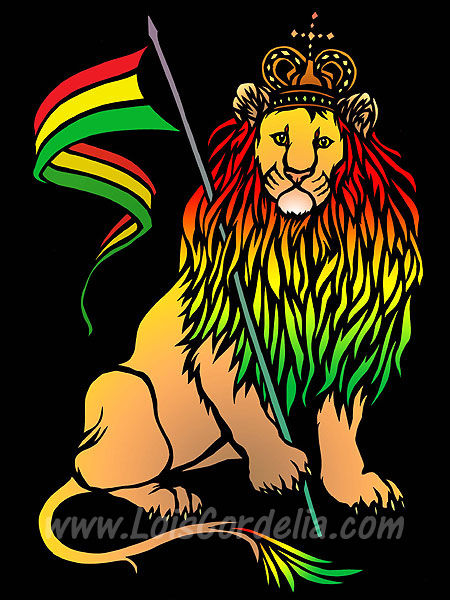











 |
Frequently Occurring
Biblical Quotations
In Reggae Songs
Book of Revelation
Revelation is the last book of the New Testament, and
contains many vivid descriptions of visions
and symbols. The ultimate and complete
destruction of all evil, as personified by figures like Babylon, is a prevalent theme. The Greek word for
'revelation' is 'apokalypsis', which has led to the term
'apocalyptic' being applied to the genre of sacred
literature that predicts end-time judgements. The book of
Daniel in the Old Testament was the earliest known
example of such writings, though there are apocalyptic
tendencies in even older scriptures. There are many links
between the book of Daniel and the book of Revelation -
Daniel was told, 'shut up the words, and seal
the book, even to the time of the end' (Daniel
12:4), and so
not until John's Revelation do we learn that the only one
found worthy 'to open the book, and to loose
the seven seals thereof' is the Lion of the
tribe of Judah, Christ Jesus himself.

Revelation
5:5 - And one of the elders saith unto me, Weep not:
behold, the Lion of the tribe of Juda, the Root of David,
hath prevailed to open the book, and to loose the seven
seals thereof.
The phrase, "Lion of the tribe of Juda",
is found nowhere else in the Bible, though Judah's name
is here incorporated into a title of the Messiah, because
he once unselfishly offered himself in place of his
brother Benjamin (Genesis
44:18-34). As St
Matthew records in the first
chapter of his
gospel, David, Solomon,
and all the Israelite kings that followed them, as well
as Jesus Christ, were all descendants of
Judah. Haile Selassie I, Emperor of
Ethiopia, also claimed descent from Solomon, and thus
from Judah. At his coronation, on 2nd November 1930, he
therefore bore, among others, the title of 'The Lion
Of The Tribe Of Judah [hath prevailed]', which is a
long-standing motto of Ethiopian monarchs. In Rasta
reggae lyrics, the term 'Conquering Lion of
the Tribe of Judah' is usually associated with Haile
Selassie I, who is seen as a christ figure. Some
Rastafarians see Haile Selassie as God incarnate, or even
as a reincarnation of Jesus Christ, despite the fact that
Haile Selassie himself said otherwise, and was after all
an Ethiopian Orthodox Christian who trusted in Christ as
his Saviour. ... Songs to check out include Lee 'Scratch'
Perry's own idiosyncratic version of the Wailers'
Classic, 'Soul Rebel'.

Revelation
14:8 - And there followed another angel, saying, Babylon
is fallen, is fallen, that great city, because she made
all nations drink of the wine of the wrath of her
fornication.
Babylon is finally punished and cast down. The 'Babylon' referred to in the book of Revelation is
originally Rome, but in Rastafarian terms, the name has
become applied to any oppressive society. See, for
example, 'Rastaman Chant', a traditional song arranged by
Bob Marley and the Wailers.
Revelation
16:16 - And he gathered them together into a place called
in the Hebrew tongue Armageddon.
'Armageddon' (Hebrew 'Har-Magedon')
is likely to be purely symbolic, rather than referring to
an actual place. It signifies the final spiritual
conflict between evil and God's Kingdom. See,
for example, the song called 'Armageddon' by Bunny Wailer (in which this
word is pronounced 'Armagideon').
Revelation
17:5 - And upon her forehead was a name written, MYSTERY,
BABYLON THE GREAT, THE MOTHER OF HARLOTS AND ABOMINATIONS
OF THE EARTH.
Mystery Babylon, here symbolically revealed and put to
shame by having this title written on her forehead, is
contrasted with the "mystery of God"
and "godliness", as
spoken of elsewhere in the Bible (Revelation
10:7, and 1 Timothy 3:16). ... See, for example, 'Mystery Babylon' by Peter Tosh, or 'Babylon' by Messian Dread.
Revelation
19:16 - And he hath on his vesture and on his thigh a
name written, KING OF KINGS, AND LORD OF LORDS.
Christ is not only a very powerful King, but the most
powerful of all ages. The expression, "King
of Kings and Lord of Lords", is also
found in Revelation
17:14, and in 1
Timothy 6:15. It
is also another title associated with Haile Selassie I. See, for example, 'King Of Kings' by Max Romeo and Dennis
Alcapone, or 'Mighty Negus' by Israel Vibration.
Back to main index of
Frequently Occurring Biblical Quotations in Reggae Lyrics

|

